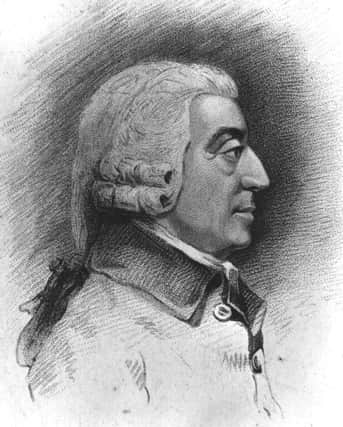Book review: Adam Smith: What He Thought, and Why it Matters, by Jesse Norman


The author, Jesse Norman, is a Tory MP and indeed under-Secretary of State in the Department of Transport. He has been an academic and a banker. He is that rarity now, an intellectual politician and author. His last book was about Edmund Burke. Now in our present discontents he turns to Adam Smith: What He Thought and Why it Matters.
The book is lucid, comprehensive and sympathetic. He defends Smith from his detractors, and even more importantly, rescues him from his most zealous, and therefore mistaken, admirers. He insists that The Theory of Moral Sentiments is every bit as important as The Wealth of Nations; the books complement each other.
Advertisement
Hide AdAdvertisement
Hide AdHe addresses commonly accepted views, and calls them myths: that “Adam Smith was an advocate of self-interest”; that “Adam Smith was pro-rich”; that “Adam Smith was anti-government”; that “Adam Smith was first and foremost an economist”. All these opinions have been held and advanced by intelligent and learned men and women. All can be maintained only by simplifying, distorting or simply ignoring much that Smith thought and wrote. It was one of the many merits of Norman’s book that he brings the reader back, time and again, to Smith’s own words. Moreover, when Smith uses a word in a sense which belongs to the 18th century rather than to our time, Norman is alert to explain what Smith actually meant.
Given his circumstances, it is extraordinary that Smith should be so widely regarded as the father of economic or father of political economy. He lived before the Industrial Revolution. Even Glasgow, where he lectured at the university, was still a commercial, rather than industrial, city. Manufacturing was still cottage-work. If financial markets were no longer in their infancy, they were barely adolescent. Transport was no faster than it had been in the time of the Roman Empire.
Nevertheless, everything that Smith wrote remains relevant today. It does so because he was engaged, not in abstractions, but in what he, and his friend and mentor, David Hume, spoke of as “the Science of Man”: on what basis do we form opinions? On what basis do we act? How and why do we engage with each other? All such questions are of perennial importance when considering political economy. As Norman writes, in all Smith’s work “what we would call ‘culture’ is in several different aspects an absolutely central concern… what is the nature of commercial society? How does it shape human norms and human personality?”
Norman makes the case that we don’t turn to Smith to be told what to think about our present uncertainties and discontents. But reading Smith and learning from him may teach us how we might best think about such matters as inequality, crony capitalism, the consequences of mass migration, the disconnection of the super-rich from social norms and a social responsibility. Smith’s “whole emphasis is on communication and community, on what free people have in common between them.”
The flowering of Scotland in the 18th century was amazing. For a small, poor country to have given birth in little more than half a century to David Hume, Adam Smith, Robert Burns and Walter Scott, all of whom changed the way people felt and thought, is a phenomenon with few parallels. Smith is both the best-known and the least-known of them – best-known because politicians and economists claim to be his followers (when they aren’t his opponents); least-known because his life was uneventful, his personality obscure. Norman’s book comes in three parts: Life, Thought, and Impact. All are good. He writes of economic questions in a manner admirably free of jargon, and his work is properly based not only on his intellectual understanding of Smith’s work but on the sympathetic nature of his engagement with it.
Adam Smith: What He Thought, and Why it Matters, by Jesse Norman, Allen Lane, 379pp, £25. Jesse Norman is at the Edinburgh International Book Festival on 15 August.